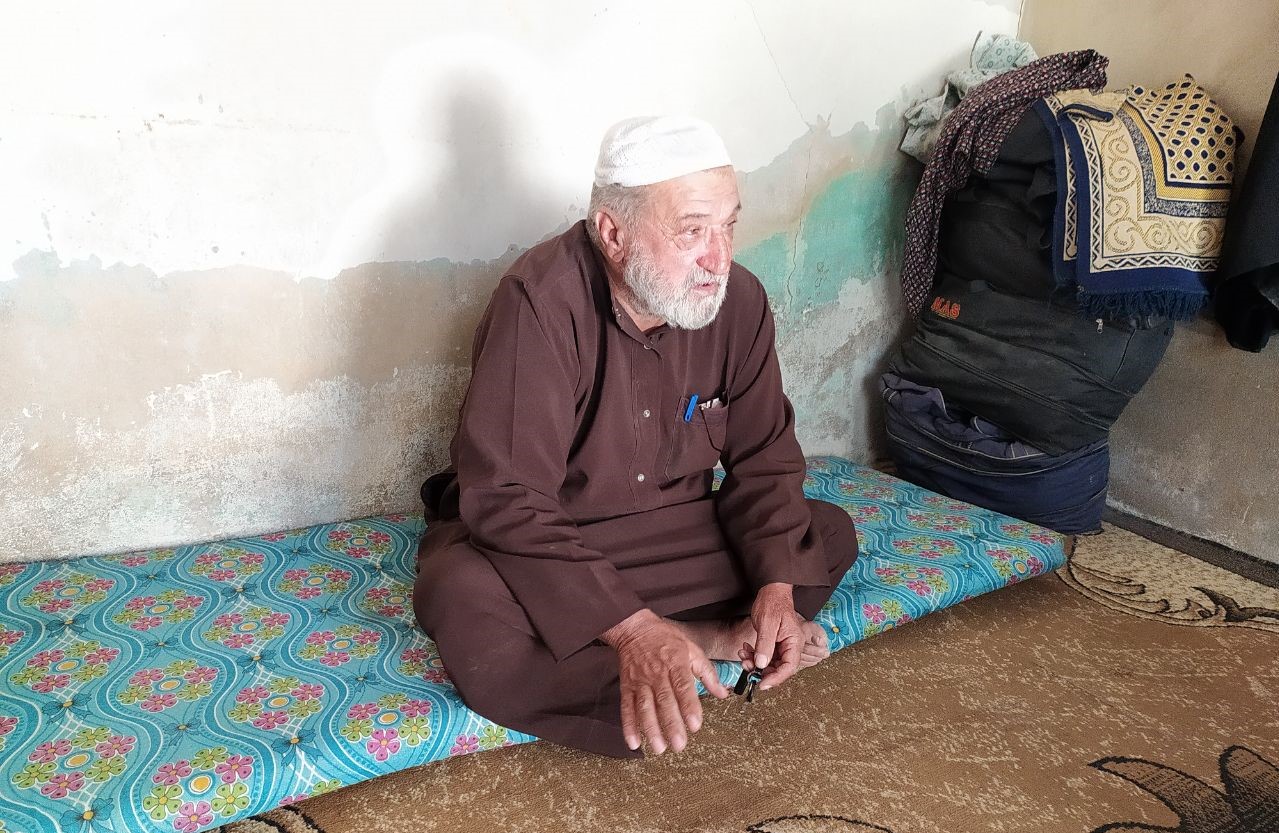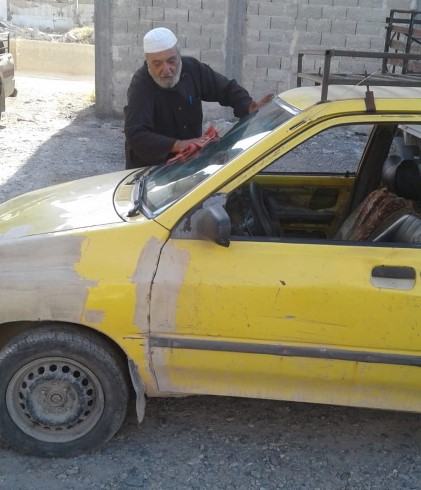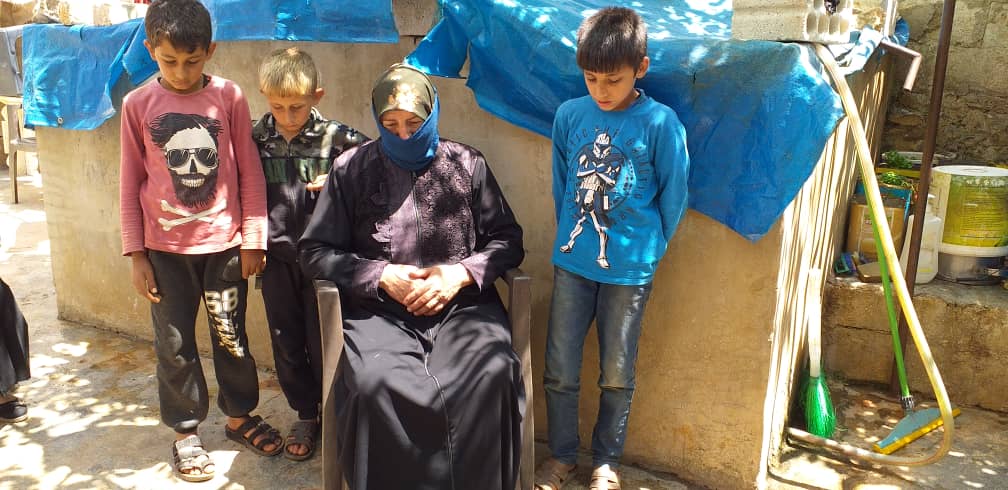In their own words: Facing COVID-19 after fleeing war

Older people in Northern Syria have faced the trauma of being displaced from their homes and cities by war, often several times over as the frontlines for the battle have shifted. Now they are dealing with coronavirus (COVID-19) too. Two older people told us in their own words how they are coping.
Abu Saeed, Al-Bab City
Abu Saeed is 67 and comes from Palmyra. He has been displaced for the fourth time due to the conflict in Syria, and currently resides in the city of Al-Bab in Aleppo. He lives with his wife on their own (they have no children) and must work as a taxi driver to feed them both. He spoke shyly at first, growing bolder as he explained his predicament.
"Other relief organizations have abandoned us and so have the authorities, because our family is small, and we do not have children, so we don’t have the right to get any assistance. Who does have the right then? I am elderly, approaching seventy, I previously had open-heart surgery, and I am now suffering from diabetes and high blood pressure.”
Despite the years of displacement and the bitterness of loss, his eyes shone brightly as he said: "In the past, in my city, I had my farm, my house, my job ... and I was very important in the community. But now... we face displacement and poverty, then the virus comes to make matters worse. This we can’t endure.”
It is a difficult and frightening time for older people like him. “Because we are elderly, we can’t do anything, trapped in our houses, afraid of spreading the virus. We hear that it is a dangerous disease, and it can’t be treated. If someone feels ill, he deteriorates rapidly. And he may die. Thank God it has not yet spread in the region which we inhabit, however, we try to take all possible precautions, especially after the health team visited us and alerted us to the necessity of that, and gave us information about this disease, how it spreads, and how to save ourselves from it. God willing, we can protect ourselves from the virus, but we face many challenges. We get water by filling water containers.”

Despite his age, Abu Saeed must go out to work each day, putting himself at greater risk. “As well the difficult conditions and the high prices, and the difficulty in getting the necessary medicines and supplies, I find myself forced to leave the house and work as a taxi driver and meet a lot of people every day, although I wear a face mask. Whilst I work, my wife goes out to get what we need early before the crowds. Then she comes back and cleans, to preserve our health and our house.”
Age International has been able to support older people in the community by staying in touch throughout the pandemic to provide information and advice, refer and follow up cases, and provide us with materials about the virus. “We are grateful to them as they are still communicating with us. They reassure us, answer our various questions, and confirm our continued protecting measures."
"As for us, all we wish is for the world to be safe from this virus. Personally, I hope to find the expensive medicines needed to improve our life. We hope the nightmare of the war will be over so we can go back to our cities peacefully.”

Nora Ahmed Al-Khalaf, Sheikh Youssef
Mrs Al-Khalaf is 60 years old and was born in the eastern countryside of Hama. She currently lives with her son and family in Sheikh Youssef, Idlib. Because of the ongoing conflict they had to uproot their lives to find a new home, and not for the first time. She also shared her experiences with us.
“We face difficult living conditions here because of the lack of job opportunities and the scarcity of resources. One of the reasons is the emergence of the COVID-19 (coronavirus) epidemic, which has become the talk of people everywhere. Initially, we got some information from the news and through our phones, and later through the mobile awareness team that works in the town. We know that the virus is fast spreading, and no one has yet been able to produce a cure for it, but that it can be prevented with cleanliness, and avoiding gatherings and crowds.
I’m worried about the disease spreading to Northern Syria. We try to take precautions, but the water is not sterilized and transported through tanks filled with rust, and the camps are crowded with others who have had to leave their homes. Because of the virus, my movement was restricted, and I had to stay at home for a long time and not visit my neighbours and relatives.
I've been afraid since the beginning because as an older person I may be more susceptible to illness than others. In the beginning, we did not adhere to the instructions and went out and met with neighbours and relatives, but after recommendations and warnings, we ceased visits and gatherings. This caused a lot of boredom and increased tension.
We, the elderly, live in a state of fear because we hear about the large numbers of infected and dead people due to the virus, despite the countries applying strict measures to prevent the spread of the virus. We know that the virus does not discriminate, but we are old and have chronic diseases, so we know that we are more susceptible to disease. We also know that there are a few centres in this area which can receive patients with the virus.
I worried that medicine supplies might be disrupted due to the closure of the border crossings. I am diabetic and I need to take medicine regularly or my condition will get worse, but thank God the medicine is still available and free at the health centre.
As well as reducing visits and gatherings as much as possible, I know that if I begin to suffer from one of the symptoms, I should isolate myself even from those I live with, try to strengthen my immunity and, if the symptoms worsen, go to the hospital.
I’d like to thank Age International’s educational teams who visited us several times to check on our health and give us information about the virus and the proper and correct methods of prevention. I’d also like to thank the team who visited us to understand as part of a review to understand what we needed to deal with the virus and to provide materials and awareness sessions for everyone. They have been keeping us updated before and during the lockdown.
I hope that this virus will end as soon as possible, that people will return to normal life, and return to the villages and towns that we had to leave behind.”
Learn more
Find out more about how we're supporting older people in Syria during COVID-19
Help us to continue supporting older people around the world
Whether with better healthcare, a secure income or life-saving aid – your gift could help change lives.
 Follow us on social media
Follow us on social media
Keep seeing our stories or ask us a question - connect on Facebook and Twitter.
